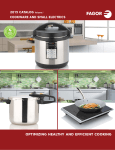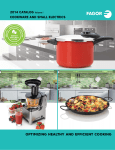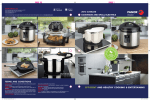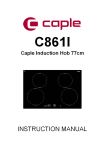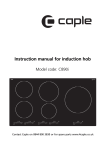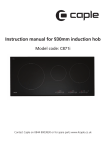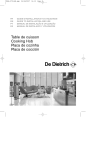Download Asko HI1832 User guide
Transcript
INSTRUCTIONS FOR USE HI1632 HI1832 Instructions for use Induction hob Dear ASKO Customer, Thank you for choosing this superior-quality product. We guarantee that the quality of the internal components of your new machine is equal to that of its external elements, and that the standards adhered to during its manufacture are as high as the efficiency of its performance. We hope that this product will fully meet your expectations for many years. In order to get the best from your machine, we recommend that you begin by familiarising yourself with the manual. This manual also contains information on protecting the environment. Tips Safety recommendation We have designed this cooking hob for use by private individuals in their homes. These cooking hobs are intended exclusively for cooking beverages and foodstuffs and do not contain any asbestos-based materials. Residual heat A cooking zone can remain hot for several minutes after use. An “H“ is displayed during this period. Avoid touching the hot areas during this time. Child safety Your hob has a child safety which locks it when stopped or during cooking (see section: use of child safety). Do not forget to unlock before using again. For users with heart pacemakers and active implants. The functioning of the hob conforms to current electromagnetic interference standards and thus is in total compliance with legal requirements (89/335/EEC directives). In order to avoid interference between your cooking hob and a pacemaker, your pacemaker must be designed and programmed in compliance with the regulations that apply to it. Consequently, we can only guarantee that our own product is compliant. With regard to the compliance of the pacemaker or any potential incompatibility, you can obtain information from the manufacturer or your attending physician. Warning Electrical Danger Ensure that the power cable of a connected electrical appliance near the hob is not in contact with the cooking zones. If a crack appears in the surface of the glass, disconnect your appliance immediately to prevent a risk of electric shock. To do this, remove the fuses or use the circuit breaker. Do not use your hob until you have replaced the glass worktop. Warning Keep this user guide with your appliance. If the appliance is ever sold or transferred to another person, ensure that the new owner receives the user guide. Please become familiar with these recommendations before installing and using your oven. They were written for your safety and the safety of others. 2 Tips Care for the ENVIRONMENT — This appliance’s packing materials are recyclable. Recycle them and play a role in protecting the environment by depositing them in municipal containers provided for this purpose. — Your appliance also contains many recyclable materials. It is therefore marked with this logo to indicate that used appliances must not be mixed with other waste. Recycling of the appliances organised by your manufacturer will thus be undertaken in optimum conditions, in accordance with European directive EC/2002/96 relating to electrical and electronic equipment waste. Consult your local authority or your retailer to find the drop-off points for used appliances that is nearest to your home. — We thank you for your help in protecting the environment. Warning Installation should only be performed by installers and qualified technicians. This appliance complies with the following European directives: - Low Voltage Directive 73/23/CEE modified by directive 93/68/CEE for the insertion of the EC marking. - Electromagnetic Compatibility Directive 89/336/CEE modified by directive 93/68/CEE for attaching the CE mark. - EC regulation no. 1935/2004 concerning materials and objects intended for contact with food substances. 3 Table of contents Tips 2 Safety recommendation 2 Residual heat 2 Child safety 2 For users with heart pacemakers and active implants. 2 Care for the ENVIRONMENT 3 Description of your Appliance 5 Description of the top 6 Using your Appliance 7 Induction receptacles 7 The induction principle 7 Cookware 7 Which cooking zone should I use with which receptacle? 7 Description of control panel 8 Powering on 8 Off 8 Adjusting the power level 8 Adjusting the timer 8 Using the “CHILD SAFETY DEVICE” 9 How to lock the control panel? 9 How to unlock the control panel? 9 Operating safety 10 Residual heat 10 Temperature limiter 10 Protection against overflows 10 “Small Items” safety 10 Auto-Stop system 10 4 Cooking chart For the fitter Electrical connection Hook-up of 400V 2N~ - 16A Hook-up of 220-240V~ Choice of location Build-in Caring for and cleaning your top Caring for your appliance Maintaining your appliance 11 12 12 12 12 13 13 14 14 14 Description of your Appliance B C B A A D A Air intake B Air outlet C Vitroceramic glass D Power cord 5 P00023 Description of the top 18 cm 50 W - 2800 W 16 cm 50 W - 2200 W P00031 18 cm 50 W - 2800 W 21 cm 50 W - 3100 W 18 cm 50 W - 2800 W 18 cm 50 W - 2800 W 6 21 cm 50 W - 3100 W 16 cm 50 W - 2200 W Using your Appliance Which cooking zone should I use with which receptacle? Induction receptacles Cooking area cooking* A Cookware to use 16 cm 10 ..... 18 cm C 18 cm 12 ..... 22 cm B 21 cm 18 ..... 24 cm 23 cm 12...... 26 cm 28 cm 12 ..... 32 cm + - A Inductor B Electronic board C Induced electric current The induction principle The principle of induction is based on a magnetic effect. When you place your cookware on a cooking zone and you turn it on, the electronic boards in your cooking hob produce “induced” currents in the bottom of the cookware and instantly raise its temperature. This heat is then transferred to the food, which is simmered or seared depending on your settings. *depending on model Tip To check the suitability of your cookware: Place the pan on a cooking zone at power level 4. If the display remains on, your cookware is compatible. If the display flashes, your cookware cannot be used with induction cooking. You can also use a magnet to test the cookware. If a magnet “sticks” to the bottom of the cookware, it is compatible with induction. Cookware Most cookware is compatible with induction. Only glass, terra cotta, aluminium without a special finish on the bottom, copper and some non-magnetic stainless steels do not work with induction cooking. We suggest you choose cookware with thick flat bottoms. The heat will be distributed better and cooking will be more uniform. By choosing cookware that displays this logo on its bottom or on its packaging, you can be certain that it is perfectly compatible with your hob under normal operating conditions. To help you choose, a list of cookware is provided with this guide. 7 Using Your Appliance Adjusting the timer Description of control panel There is a rotating timer for each cooking zone. The 4 timers can be used together. C A B A Start/stop buttons. B Timer / power level buttons. C Timer buttons. Powering on 1 2 Press the start/stop button for the cooking zone you want to use. A flashing 0 display and a beep indicates that the cooking zone is on. A fixed dot appears in the selected display. You can now choose the desired power level. If you do not select a power level, the cooking zone will automatically switch off. Stop Hold down the start/stop button for the cooking zone used. Adjusting the power level Slide your finger on the control in a clockwise direction to increase your power level from 1 to P (maximum power) and in the anti-clockwise to reduce it Direct access to power: press the central part : P, 2 presses ->6 6, 3 presses -> 3, and 4 1press ->P P. presses—>P When it is switched on you can move directly to maximum power “P” by pressing the “-” button. Tip You can adjust the the power setting and timer 1 by 1 with each press on the right or left part of the circular part. 8 -1 +1 By pressing the button repeatedly you can select the cooking zone to which you wish to apply the timer. The timer leds can only be set for zones that are in operation. The led of the timer being displayed will be highlighted. To use the timer: 1 2 3 Switch on the cooking zone and adjust the power level. Select the timer led of the cooking zone. Slide your finger on the circular part until you have the desired setting for your cooking time. For long times, turn the dial anti-clockwise to get to 99 minutes more quickly. The timer starts counting only if the cooking zone is covered with an item of cookware. When the cooking is finished the zone switches off, the timer indicates 0, and you are notified by a sound signal. 4 Press any button to stop the beeping. Using Your Appliance Hob locked in operation To change the timer settings: 1 2 1 2 - Select your timer - Turn it towards the + or the - on the circular part. To stop the timer: - Select your timer - Hold down the button . To access the timer directly: Press the button and the setting is made in 10minute increments. Using the “CHILD SAFETY DEVICE” Your cooking hob has a child safety function which locks controls which are not in use (for cleaning, for example) or during cooking (to keep your settings). For safety reasons, only the “stop” button is always active and allows the heating zone to be switched off even if locked. The display of the cooking zones in operation alternately indicates the power and the lock symbol . When you press the power or timer keys of the zones in operation, the LED of the lock lights; it will go out after a few seconds, only the “stop” button is always active. In the cooking zones which are not in operation, the symbol and the LED light when you press the “on/off” buttons. This display disappears after a few seconds. The hob is locked when switched off The LED above the lock key is unlit. Pressing this button for a short time causes the LED to light. The LED is displayed when you press an on/off button in any zone. How to unlock the control panel? Press the unlock button until the LED goes out and a double sound signal confirms your operation. Tip Remember to unlock your hob before reusing it (see section “use of child safety function”). How to lock the control panel? Keep the locking key held down until the LED above it lights and a sound signal confirms your operation. 9 Using Your Appliance Operating safety Residual heat After intensive use, the cooking zone that you have just used can remain hot for several minutes. A “H“ is displayed during this period. Avoid touching the hot areas during this time. Temperature limiter Each cooking zone is equipped with a safety sensor that constantly monitors the temperature of the bottom of the cookware. In the event that an empty vessel is left on a cooking zone that is on, this sensor automatically adjusts the power output of the hob, thereby avoiding any risk of damage to the cookware or the hob. “Small Items” safety A small object (such as a fork, a spoon, a ring, etc.) left alone on the hob is not detected as a piece of cookware. The display flashes and no heat is produced. Protection against overflows The hob may shut down (with the adjacent symbol in the display) and a beep (depending on the model) may sound in any of these 3 situations: - Overflow that spills onto the buttons. - Damp cloth placed over the buttons. - Metallic object placed on the buttons. Clean the hob or remove the object, then begin cooking again. Auto-Stop system If you forget to turn off a preparation, your cooking hob has an “Auto-Stop system” safety function which automatically turns off the forgotten cooking zone after a predefined time (between 1 and 10 hours, depending on the power used). If this safety function is activated, the disconnection of the cooking zone is signalled by the display “AS” or “A” in the control zone and a beep is emitted for approximately 2 minutes. Simply press any of the buttons to stop it. A double beep will confirm your action. Warning Several small objects together on a cooking zone may be detected as cookware. If the display remains on: power may be supplied and the objects may be heated. 10 Cooking chart FRY SOUPS COOK/GLAZE BRING TO BRING BACK TO THE THE BOIL BOIL SIMMERING COOK/SIMMER KEEP HOT P 9 8 7 6 5 4 3 2 1 P 9 8 7 6 5 4 3 2 1 P 9 8 7 6 5 4 3 2 1 BROTHS THICK SOUPS FISH COURT-BOUILLON FROZEN SAUCE THICK, FLOUR-BASED WITH BUTTER AND EGGS (BEARNAISE, HOLLANDAISE) PREPARED ENDIVES, SPINACH LEGUMES BOILED POTATOES VEGETABLES GOLDEN BROWN POTATOES SAUTÉE DEFROSTING MEAT FRYING SAUCES POTATOES OF VEGETABLES THIN MEAT PAN-FRIED STEAKS BARBECUE (CAST IRON GRILL) DEEP FROZEN CHIPS FRESH MISCELLANEOUS CHIPS PRESSURE COOKER (AS SOON AS A WHISPERING SOUND IS HEARD) FRUIT COMPOTES PANCAKES CUSTARD MELTED CHOCOLATE JAMS MILK FRIED EGGS PASTA SMALL BABY POTS (DOUBLE-BOILER) STEWS CREOLE-STYLE RICE RICE PUDDING 11 For the fitter Electrical connection These hobs must be connected to the mains using a socket in compliance with publication IEC 60083 or an all-pole circuitbreaker device in compliance with the installation rules in force. When power is first supplied to your hob, or after an extended power cut, an indicator light will appear on the control panel. Wait for 30 seconds approximately until this information disappears before using your hob (This display is normal and it is intended, if applicable, for your aftersales service. In all cases, the user of the hob should disregard it). Hook-up of 400V 2N~ - 16A Separate the 2 phase wires (L1 and L2) before connection. Black-grey Brown Green/yellow Blue N Neutral L1 L2 Live Earth For a 400 V 2N triphase connection, if your hob malfunctions, check that the neutral conductor is properly connected. Hook-up of 220-240V~ Warning Black-grey Green/yellow Blue Brown L Warning Earth Live Neutral N 32A Green/yellow Blue Brown 16A for model 803HI16322 32A for model 803HI18322 Earth Live Neutral N L 12 If the power cable is damaged, it should be replaced by the manufacturer, its after-sales service department or by a qualified person to avoid danger. The safety wire (green-yellow) is connected to the appliance’s terminal and must be connected to the ground lead of the electrical set-up. In the case of connection to an electric wall socket, it must remain accessible after installation. The fuse in your set-up must be 10 amperes. If the power cable is damaged, it must be replaced by the manufacturer, its After-Sales Service Department or a similarly qualified person to avoid danger. For the fitter 51 58 - 77 6,4 49 4c 56 - 75 4c m A 4c m m On 80cm models, ensure that the unit cross member is not blocking air passage. If necessary, make a chamfer. m 4 cation il nt ce ve spa Choice of location Your appliance should be positioned so that the mains switch is accessible. The distance between the edge of your appliance and the side and rear walls (or partitions) must be at least four centimetres (area A). Your appliance can be easily integrated above a cabinet, an oven or a build-in household appliance. You must simply ensure that the air intakes and air outlets are clear (See “Description of Your Appliance” section). Build-in Follow the diagram above. Glue the foam seal underneath your appliance by following the outline of the worktop upon which your appliance will rest. This will allow you to achieve an airtight seal with the worktop. To do this: 1 Follow the diagram above. Glue the foam seal underneath your appliance by following the outline of the worktop upon which your appliance will rest. This will allow you to achieve an airtight seal with the worktop. 2 Attach the clips to the hob*. *Depending on model Tip If your oven is located below your hob, the hob’s thermal safety measures forbid the simultaneous use of the hob and the pyrolysis program of your oven. Your hob is equipped with an antioverheating safety device. This safety can be activated, for example, when the hob is installed over an oven that is not sufficiently insulated. If this occurs, a series of small lines appear in the control panel. In this case, we recommend that you increase the ventilation of your hob by creating an opening in the side of your cabinet (8 cm x 5 cm) and/or you can also install the oven insulation kit that is available from the After-Sales Service Department. Warning You must ensure that the air intakes located under your cooking appliance remain clear at all times. For all types of installation, your induction hob needs proper ventilation. 13 Caring for and cleaning your top Caring for your appliance Avoid hard shocks from cookware: The vitroceramic glass surface is highly resistant, but not unbreakable. Do not place any hot lids flat on your cooking hob. A “suction” effect might damage the vitroceramic top. Avoid rubbing cookware: in the long term this might cause damage to the decoration of the vitroceramic top. Do not place cookware on your frame or trimmings (depending on model). Avoid using cookware with rough or bumpy bottoms: they can capture and transfer particles that may produce stains or scratches on your hob. These faults, which do not prevent operation or unsuitability for use, are not covered by the guarantee. Do not store cleaning products or flammable products in the cabinet underneath your cooking hob. Do not reheat an unopened tin: it might explode. Of course, this precaution applies to all types of cooking. For cooking, never use aluminium foil. Never place items wrapped in aluminium foil or packaged in aluminium dishes on your cooking hob. The aluminium will melt and permanently damage your cooking appliance. Objects not intended for cooking should never be placed on the hob (risk of powering on, scratches, etc.). Steam cleaning should never be used. The steam jet could damage your hob. Maintaining your appliance TYPES OF STAINS/SPOTS USE WHAT TO DO? Light. Cleaning sponges. Thoroughly moisten the zone to be cleaned with hot water, then wipe off. Accumulation of baked-on stains/dirt. Sugar spills, melted plastics. Cleaning sponges. Scraper for glass. Thoroughly moisten the zone to be cleaned with hot water. Use a scraper for glass to remove the large bits, follow with the rough side of a household sponge, and then wipe off. Rings and hard water residue. White vinegar. Apply warm white vinegar to the stain, let stand, then wipe with a soft cloth. Shiny metallic streaks. Weekly maintenance. Apply a cleaning agent for vitroceramic glass (preferable one with silicone for its protective properties) to the surface. cream 14 Cleaning agent for vitroceramic glass. cleaning sponge special sponge for delicate crockery powder abrasive sponge CZ5700116 / EN 11/09


















